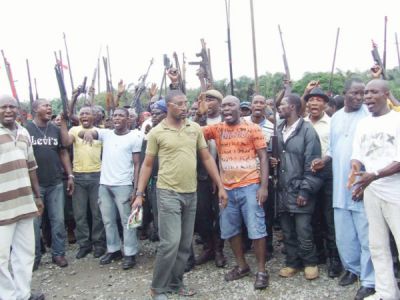This post has already been read 21090 times!
Without any prejudice, Nigeria is presently bewildered with a number of problems. The current one being the herdsmen killing spree. In just two months, the Fulani Herdsmen, or those who hide under the guise of that name to perpetrate these dastardly acts have killed scores of innocent Nigerians. Udo Uwani in Enugu State, Agatu community in Benue State and several other places to mention but a few cannot forget in a hurry the trauma that these attacks had left on their communities. With all these killings, one would be tempted to think if really we have security agencies, paid with the tax payer’s money to protect lives and properties in this country. With our ever indefatigable Nigeria Army, the Nigerian Police Force (NPF), the Nigeria Security and Civil Defence Corps (NSCDC) and the Department of State Security Services (DSS), heinous crimes still take place unabated. Of all these security agencies, the NPF is the one saddled with the responsibility of protecting and serving Nigerians.
Over the years, there have been arguments and counter arguments about the creation of state police, and that the Nigeria Police Force as it is today cannot adequately protect Nigerians. The present Federal police structure is too detached from the people they are policing simply because a country of more than 170,000,000 people cannot be effectively policed with a force of less than 500,000 police personnel, and hence, the need for states to start their own policing system. It is often said that most crimes are local, and therefore the state’s response to crime must also be local, and this may be done in collaboration with the Federal police as it is done in developed nations of the world. Also, Nigeria’s geographical area is too large for a central police command; policing citizens should be the responsibilities of the respective states as this will go a long way in reducing criminal activities and other forms of hooliganism in states and local government areas.
Those who are opposing the creation of state policing are doing more disservice than service to themselves and the nation. Dr. Philip Ugbodaga (former Edo State Chairman, Nigeria Medical Association and National President, Save Nigeria Group) once stated that the Nigerian Federation is very dysfunctional and requires urgent restructuring and the creation of state police is one of the fundamental requirements of the call by patriots for the operation of a true federalism in Nigeria. He further stated that those opposing state policing think that once it is in operation, a governor would possess some absolute powers to make use of the state police for some selfish ambitions like illegal arrests and detention of opponents without trial. While this statements and assertion may be correct, establishing state police under a proper legislative framework will definitely prevent the state governors from misusing them. For instance, there could be a Federal regulatory body that establishes the minimum qualifications for employment into the force, make rules to prevent jurisdictional conflict and other inter-state problems and perhaps maintain a basic training school for all policemen. Therefore, the misleading and unfounded precedent that state police will be abused through political interference and manipulation should totally be discarded.
However, as robust as the argument in support of the creation of state policing is, the political will to embrace this argument on the part of the Federal government is really not there. The reason for this being that creating state police will require a constitutional amendment. The 1999 constitution as it is today places the policing of the entire nation on the shoulders of the federal governments. Section 214 of the 1999 provides that the Nigerian police force shall be under the full and exclusive control of the Federal Government. Furthermore, in section 215 subsection 2 of the same constitution, it was stated that “the Nigeria police force shall be under the command of the Inspector-General of police and any contingents of the Nigeria police force stationed in a state shall, subject to the authority of the IGP, be under the command of commissioner of police of that state”.
But those in firm support of this argument of a state policing believe that the policing of the citizens of this country should be the duty of the various states and not the federal government.  Their argument is supported by the fact that in the United States of America, the Federal government owns the Federal Bureau of Investigation (FBI), then the police forces or departments are owned by the states and the municipal authorities. Apart from the US, countries like Australia, Spain, Canada, Brazil and India all operates the state policing system. It is a pity that Nigerian politicians only travel abroad for leisure and all manner of jamborees, but fail to emulate those good things working for those nations.
Their argument is supported by the fact that in the United States of America, the Federal government owns the Federal Bureau of Investigation (FBI), then the police forces or departments are owned by the states and the municipal authorities. Apart from the US, countries like Australia, Spain, Canada, Brazil and India all operates the state policing system. It is a pity that Nigerian politicians only travel abroad for leisure and all manner of jamborees, but fail to emulate those good things working for those nations.
With a state controlled police, law and order would be more effectively maintained within the state. The personnel of such a force would be better able to contend with any uprising- be it Boko haram, Fulani herdsmen, Kidnappings and even armed robbery incidences would be drastically reduced. Besides, some of the state governments already have their own vigilante groups or something very close state police established by law.  For instance in the Southwest, there is the Oodua People’s congress popularly known as OPC, in the North, Hisbah is the Sharia police in Kano and they work in tandem with the Federal police. In the South-East, there are the Bakassi Boys and in the South-South, they boast of the Egbesu boys. The existence of these semi-police forces is a pointer to the truth that there is a policing gap across the states of the federation which these groups are filling.
For instance in the Southwest, there is the Oodua People’s congress popularly known as OPC, in the North, Hisbah is the Sharia police in Kano and they work in tandem with the Federal police. In the South-East, there are the Bakassi Boys and in the South-South, they boast of the Egbesu boys. The existence of these semi-police forces is a pointer to the truth that there is a policing gap across the states of the federation which these groups are filling.  If this is currently the case across the length and breadth of the nation, why then waste time in putting a state police in motion that will be properly regulated by the law?
If this is currently the case across the length and breadth of the nation, why then waste time in putting a state police in motion that will be properly regulated by the law?
At this point in Nigeria, being faced with myriad of security challenges; allowing the states to have their own policing system should no longer be swept under the kept by the government. The earlier will embrace this fact, the quicker it will be overcoming some of these security problems. Before it was Boko haram and kidnappings across the nation that were trending. With relentless efforts from the Nigerian army, boko haram is already becoming a thing of the past. Now, it is the Fulani Herdsmen, who knows what is in the pipeline tomorrow? Unlike those clamouring that Nigeria is not ripe for a state police, when is Nigeria then going to be ripe for it? Does nation grow above insecurity? Will Nigeria grow above these numerous security challenges without taking a concrete decision? All these questions should be pondered upon.
Comments




